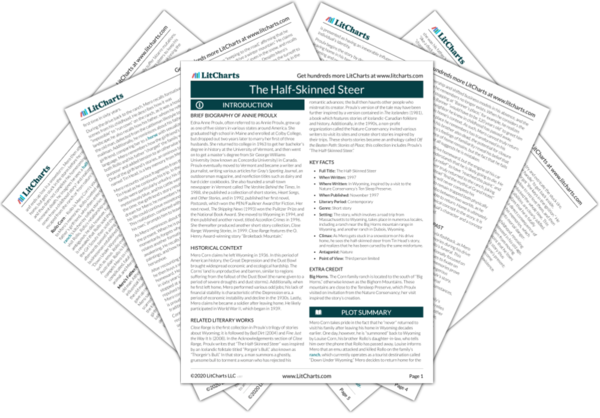Rollo Corn Quotes in The Half-Skinned Steer
Mero had kicked down thoughts of the place where he began, a so-called ranch on strange ground at the south hinge of the Big Horns. He’d got himself out of there in 1936, had gone to a war and come back, married and married again (and again), made money in boilers and air-duct cleaning and smart investments, retired, got into local politics and out again without scandal, never circled back to see the old man and Rollo bankrupt and ruined because he knew they were.
They called it a ranch and it had been, but one day the old man said it was impossible to run cows in such tough country where they fell off cliffs, disappeared into sinkholes … where hay couldn’t grow but leafy spurge and Canada thistle throve … The old man wangled a job delivering mail, but looked guilty fumbling bills into his neighbors’ mailboxes.
Mero and Rollo saw the mail route as a defection from the work of the ranch, work that fell on them.
He heard the amazement in her voice, knew she was plotting his age, figuring he had to be eighty-three, a year or so older than Rollo, figuring he must be dotting around on a cane too, drooling the tiny days away, she was probably touching her own faded hair. He flexed his muscular arms, bent his knees, thought he could dodge an emu. He would see his brother dropped in a red Wyoming hole. That event could jerk him back …
The old man’s hair was falling out, Mero was twenty-three and Rollo twenty and she played them all like a deck of cards. If you admired horses you’d go for her with her arched neck and horsy buttocks, so high and haunchy you’d want to clap her on the rear. The wind bellowed around the house, driving crystals of snow through the cracks of the warped log door and all of them in the kitchen seemed charged with some intensity of purpose.

Rollo Corn Quotes in The Half-Skinned Steer
Mero had kicked down thoughts of the place where he began, a so-called ranch on strange ground at the south hinge of the Big Horns. He’d got himself out of there in 1936, had gone to a war and come back, married and married again (and again), made money in boilers and air-duct cleaning and smart investments, retired, got into local politics and out again without scandal, never circled back to see the old man and Rollo bankrupt and ruined because he knew they were.
They called it a ranch and it had been, but one day the old man said it was impossible to run cows in such tough country where they fell off cliffs, disappeared into sinkholes … where hay couldn’t grow but leafy spurge and Canada thistle throve … The old man wangled a job delivering mail, but looked guilty fumbling bills into his neighbors’ mailboxes.
Mero and Rollo saw the mail route as a defection from the work of the ranch, work that fell on them.
He heard the amazement in her voice, knew she was plotting his age, figuring he had to be eighty-three, a year or so older than Rollo, figuring he must be dotting around on a cane too, drooling the tiny days away, she was probably touching her own faded hair. He flexed his muscular arms, bent his knees, thought he could dodge an emu. He would see his brother dropped in a red Wyoming hole. That event could jerk him back …
The old man’s hair was falling out, Mero was twenty-three and Rollo twenty and she played them all like a deck of cards. If you admired horses you’d go for her with her arched neck and horsy buttocks, so high and haunchy you’d want to clap her on the rear. The wind bellowed around the house, driving crystals of snow through the cracks of the warped log door and all of them in the kitchen seemed charged with some intensity of purpose.











